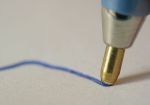 Original image: “Lily Pads, Morton Arboretum, Chicagoland, 2007” by Tamara Kaye Sellman.
Original image: “Lily Pads, Morton Arboretum, Chicagoland, 2007” by Tamara Kaye Sellman.
The simplest way to handle a meditation is to sit comfortably in a quiet, dimly lit space, light a candle, and stare at the flame while you read the meditation, multiple times if necessary. Very soft background music can help block out the sounds outside your space. You can approach a meditation in multiple ways. One popular way is to think about the meditation itself and “listen” from inside for responses to what it’s suggesting to you. “Listening” can include actually hearing words, but it can also mean feelings, intuitions, passing images and other idea “inputs” that are normal for you. Another effective way is to spend the first part of your meditation staring at the candle flame and breathing, thinking of nothing at first (do not read the meditation yet). Allow your mind to spend its stray energy and breathe all the random thoughts as far outside yourself as you can. The goal is to be blank; then read the meditation and “listen.” Sometimes, the material in the racing random thoughts you just dispelled can inform how you “hear” the wisdom in the meditation. Always remember, as creative people, we already carry solutions to our creative challenges inside ourselves. It’s how we find our access to them that unlocks our creativity and liberates us to make, be and do.
———-
Today’s meditation comes from Nancy Drew’s Guide to Life: Chapter 7, Powers of Observation
“Abandoned houses are not completely neglected if the electricity still flows.”–from The Mystery of the Ivory Charm.
If you think your own personal energy has slumped or even drained right out of you, try to remember this smart little tidbit from Nancy Drew. After all, your house (your body) may be out of shape (neglected) , but not out of commission, not until you leave this world for the next, taking your soul (your electricity) with it. This meditation is about hope, potential, and keeping at ease with yourself in all sorts of inner and outer turmoil. You may have your ups and downs, but don’t forget… even during your lowest low, your own pilot light still burns for you.
Filed under: creative writers, creative writing, creativity, inspirations, Writer's Rainbow, writing, writing life, writing resources | Tagged: coaching, creative writers, creative writing, creativity, inspirations, meditations, rainbow, seattle, tools, writer, Writer's Rainbow, writers, writing, writing for, writing life | Comments Off on Nancy Drew’s Powers of Observation: Friday’s rainbow meditation



 From the Richard Hugo House
From the Richard Hugo House  I think of myself as an accidental poet. I have written and published poems over the last 10 years, but I’ve never studied it to the extent that my serious, hard-core poet friends have. Sure, I took a (great!) poetry workshop and it helped me a lot, but if I were hard-pressed to know why my poems worked, I wouldn’t be able to tell you. I just know that learning to write poetry has made me a better fiction writer.
I think of myself as an accidental poet. I have written and published poems over the last 10 years, but I’ve never studied it to the extent that my serious, hard-core poet friends have. Sure, I took a (great!) poetry workshop and it helped me a lot, but if I were hard-pressed to know why my poems worked, I wouldn’t be able to tell you. I just know that learning to write poetry has made me a better fiction writer.
You must be logged in to post a comment.